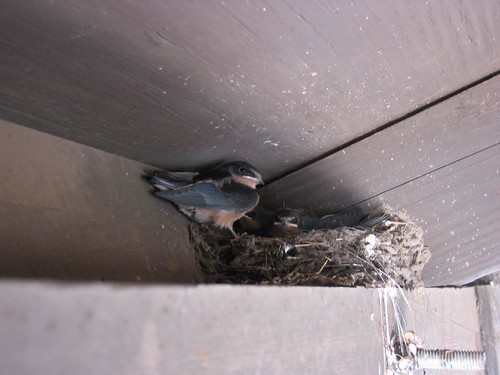
{Photos by rocketlass.}
Last night's spectacular thunderstorm--which offered among its many boisterous attractions a surprise drum-roll of hail--combined with the pleasant chittering of birds outside my window that woke me before dawn this morning has finally convinced me that spring is truly upon us.
It's also put me in the mind of Chaucer, and specifically the prologue to his Canterbury Tales, which offers my favorite evocation of the spring. I quote it here in the Middle English because it's far more fun to read that way--and as a reminder that one of the pleasures of Middle English is that you don't really have to know it to read it. If you barrel through with confidence, you'll be mostly right in your interpretation:
Whan that Aprille with hise shoures sooteThe "smale foweles maken melodye / That slepen al the nyght with open eye" cheer me greatly every time I think of them; as a notoriously light sleeper, I never feel quite so close to the birds I love to watch as when Chaucer describes their restless rest, and the way that the spring reminds them to leaven it with melody.
The droghte of March hath perced to the roote,
And bathed every veyne in swich licour
Of which vertu engendred is the flour,
Whan Zephirus eek with his swete breeth
Inspired hath in every holt and heeth
The tendre croppes, and the yonge sonne
Hath in the Ram his half cours y-ronne,
And smale foweles maken melodye
That slepen al the nyght with open eye,--
So priketh hem Nature in hir corages,--
Thanne longen folk to goon on pilgrimages.

As for goon on pilgrimages, the best I'll do on that front will be to joyfully bicycle the mile and a half to Wrigley Field on Monday. Until then, I'll make my devotions to the spring by continuing to revel in the journals of Thoreau, who on April 6th of 1856 encountered some not-so-smale foweles:
As I am going along the Corner road by the meadow mouse brook, hear and see, a quarter of a mile northwest, on those conspicuous white oaks near the river in Hubbard's second grove, the crows buffeting some intruder. The crows had betrayed to me some large bird of the hawk kind which they were buffeting. I suspected it before I looked carefully. I saw several crows on the oaks, and also what looked to my naked eye like a cluster of the palest and most withered oak leaves with a black base about as big as a crow. Looking with my glass, I saw that it was a great bird. The crows sat about a rod off, higher up, while another crow was occasionally diving at him, and all were cawing. I am not sure whether it was a white-headed eagle or a fish hawk. It rose and wheeled, flapping several times, till it got under way; then, with its rear to me presenting the least surface, it moved off steadily in its orbit over the woods northwest, with the slightest possible undulation of its wings,--a noble planetary motion, like Saturn with its ring seen edgewise. It is so rare that we see a large body self-sustained in the air. While crows sat still and silent and confessed their lord.For a week or two now, I expect I'll think of crows, when I see them, as Thoreau's crows, confessing their lord. There are worse ways to enter the spring.
Hello. Can't rightly say how I stumbled on your blog — yesterday or so, I believe — but am glad I did. Had a Thoreau-like moment this morning. Half dozen or so crows were loitering in my Chinese Elm. Grudgingly these brutes have earned my respect. I listened to their vocalizations, trying as best I could to inventory their crow-words. Too many, lost count at eight. Another congregation down the street. They said a word or two, and the gaggle above my head responded tit-for-tat. Then another group in the opposite direction joined the conversation, too. Before long, three groups were saying their hellos and talking about rotting persimmons and who knows what other neighborhood treats. Interesting birds, crows are. Cheers. Kevin
ReplyDelete